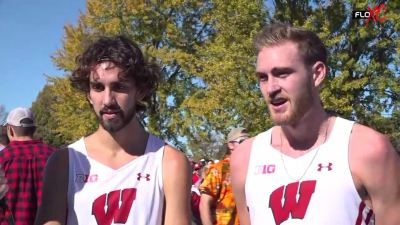Can Wisconsin Win NCAAs with a Two-Man Team? And Can Anyone Stop the Arkansas Women?
By LetsRun.com
March 7, 2019
Following the team competition at the NCAA Track & Field Championships is basically impossible unless you know what events and schools to watch for. Fortunately you are reading this article, so following the 2019 NCAA indoor meet, which runs Friday-Saturday in Birmingham, Alabama, just became a whole lot easier.
Below, we break down the battle for the men’s and women’s team titles, which will be awarded at the conclusion of the meet on Saturday. The men’s competition is as wide-open as any in recent memory. Texas Tech, Florida, LSU, Texas A&M, Georgia, Wisconsin, and Houston are all in the hunt, which means that most of the meet’s biggest individual stars — sprinters Divine Oduduru (Texas Tech) and Kahmari Montgomery (Houston), pole vaulter Mondo Duplantis (LSU), 800 man Devin Dixon (Texas A&M), distance runners Morgan McDonald and Ollie Hoare (Wisconsin) and do-everything athlete Grant Holloway (Florida) — could all play big roles in determining the team title.
The women’s meet is not as close. On paper, Arkansas is projected to win in a blowout, but big favorites have lost at this meet before. Keep reading for analysis a detailed breakdown of each team’s projected point total.
*Full men’s and women’s entries
Men: Wisconsin tries to ride its horses, Florida tries to ride Grant Holloway, & Texas Tech seeks first title
At the bottom of this section, we’ve scored out the entire meet based on seed times/marks. On paper, the men’s team battle looks to be very close: there are seven teams projected to score between 30 and 43.5 points. Obviously one team could have a great day and exceed those projections, but as it stands, 43.5 is low for a winning score. Only one team in the last 11 years — Florida last year — has scored fewer than 44 points and won NCAAs.
With the projected winning score being so low, having one or two major stars could be enough to carry a team to the title. Grant Holloway accounted for basically half of Florida’s 40 points last year (he scored 10 in the 60 hurdles, 8 in the long jump, and had the second-fastest split on their third-place 4×400) to power the Gators to victory, and they’re planning on riding him even more heavily in 2019: of Florida’s 43.08 projected points, Holloway has a hand in 34 of them (10 from the 60, 10 from the 60 hurdles, 8 from the long jump, and 6 from the 4×400). No one has ever won three individual events at a single NCAA indoor meet, and no one has won the 60 and 60 hurdles since South Carolina’s Terrence Trammell in 2000. Holloway is trying to accomplish both of those things this weekend, and given how tight the team battle is, Florida may need him to if the Gators are to repeat.
***
Can Wisconsin win it all with two distance runners?
Then there’s Wisconsin — or, more accurately, “Team Morgan & Ollie.” That would be Morgan McDonald and Ollie Hoare, the Australian distance stars who will be relied upon to score almost all of the Badgers’ points this weekend. Right now, Wisconsin is projected to score 33, with McDonald (running the 3k/5k) and Hoare (mile/3k) accounting for 25 of those points. And the other 8 basically belong to Hoare as well as they come from the DMR, which Hoare will presumably anchor.
There is a path to 40 points for Wisconsin, but it would require a monster weekend from both of their studs: McDonald would need to win the 3k and 5k and Hoare would need to win the mile and anchor Wisconsin to the win in the DMR (where they’re the #2 seed). Wisconsin could squeak out a few more points in the heptathlon (they have guys seeded at #11 and #16) and Hoare is also running the 3k, though any points from him in that event would be a bonus since it would be his fourth race in 25 hours. To be honest, we’d rather the guys in the heptathlon don’t score as it would be cool to see if McDonald and Hoare could win NCAAs by themselves (sorry other DMR legs, if Wisconsin wins, we’re giving Hoare the credit).
Wisconsin is known as a distance school, but it has won an NCAA track title before, claiming the indoor crown in 2007. They only needed 40 points to win that year, and while the distance squad piled up 28 points (18 from Chris Solinsky, plus 10 more from Tim Nelson and the DMR), they needed a runner-up finish in the 60 and a 5th in the heptathlon to get to 40. Unless Wisconsin’s heptathletes come up big this weekend, they could be one man short of a title in 2019.
***
So, who’s going to win?
Based on seeds, Texas Tech and Florida are almost dead-even (43.5 for Texas Tech, 43.08 for Florida), and both of those schools have plenty of room to improve; Texas Tech has 14 total scoring opportunities (we’re double-counting athletes entered in more than one event), including the #9 guy in the 800 and high jump and #10 guy in the pole vault, none of whom are currently projected to score, while Florida has 13, including five athletes not currently projected to score.
One of those schools is probably going to be your champion, and if that’s the case, the meet could come down to the 60 and the long jump. In the 60, the two schools’ biggest stars — Holloway for Florida, Divine Oduduru for Texas Tech — are the top two seeds, while in the long jump, Florida is projected to score eight with Holloway while Texas Tech has the #4 and #6 seeds. Plus LSU, the #3 team based on seeds (37.33 points), has the #1 long jump seed in Rayvon Grey, so how the points shake out there could go a long way toward determining the team champion.
LRC prediction: Texas Tech has a big-time star in Oduduru — the NCAA 200 champ outdoors and favorite in the 200 indoors — and a lot of scoring opportunities across many events. Florida basically needs Holloway to win everything and the rest of its team to step up to the plate. We may end up looking like idiots for betting against Grant Holloway, but we’ll go with Texas Tech to win its first men’s NCAA title in any men’s sport (their women’s basketball team won the school’s lone NCAA title in 1993).
***
Men’s projected scores, based on seeds
To create the chart below, we simply looked at the entries and assigned points to the top eight seeds according to the 10-8-6-5-4-3-2-1 scoring system used at NCAAs. In the event of a tie, we split the points as the NCAA would (eg. if two athletes tied for seventh, each would earn 1.5 points). We’ve listed the top seven women’s teams below. It’s an imperfect way of projecting the meet, but it’s a starting point for the team title race.
| School | 60 | 200 | 400 | 800 | Mile | 3K | 5K | 60 H | 4×4 | DMR | HJ | PV | LJ | TJ | SP | WT | HEP | Total |
| Texas Tech | 9.5 | 18 | 1 | 1 | 7 | 6 | 1 | 43.5 | ||||||||||
| Florida | 10.33 | 10.75 | 6 | 8 | 8 | 43.08 | ||||||||||||
| LSU | 5 | 3 | 3 | 6.33 | 10 | 10 | 37.33 | |||||||||||
| Texas A&M | 13 | 8 | 4 | 10 | 35 | |||||||||||||
| Georgia | 4 | 8.33 | 6 | 6 | 10 | 34.33 | ||||||||||||
| Wisconsin | 10 | 12 | 3 | 8 | 33 | |||||||||||||
| Houston | 2.5 | 1.5 | 16 | 0.75 | 10 | 30.75 |
Here are the events in which each school has an athlete(s) entered but not projected to score:
Texas Tech: 800 (#9), HJ (t-#9), PV (#10)
Florida: 60 (t-#15), 200 (t-#11), 400 (#12), HJ (t-#13), TJ (#10)
LSU: 200 (t-#11), LJ (t-#12), WT (#14)
Texas A&M: 400 (#9), HEP (#10)
Georgia: none
Wisconsin: HEP (#11, #16)
Houston: LJ (#11)
***
Women: Arkansas should run away with it (on paper)
The Arkansas women’s program has been among the best in the country in recent years, claiming an indoor title in 2015 and an outdoor title the following year. While it still has a ways to go to catch the vaunted men’s program, which has combined for a staggering 41 NCAA titles across indoors, outdoors, and cross country, the women should narrow the gap this weekend as they’re projected to win the team title handily with 72.5 points based on seeds. They’ll probably fall short of that — only the Oregon triple crown winners of 2017 have scored more at an NCAA indoor meet (84) — but with no other team projected above 38, the Razorbacks have more than enough wiggle room to asbsorb a couple of bad performances.
Arkansas will be counting on big points in the pole vault from twin sisters Alexis Jacobus and Victoria Hoggard (the top two seeds) and #6 seed Desiree Freier and in the 60 hurdles, where it has #2 seed Janeek Brown and #4 seed Payton Chadwick. But with projected scorers in nine events, including top-three seeds in five of them, there are a lot of points available for the Razorbacks.
Ohio State is projected to finish second with 38 points but will have a hard time catching Arkansas as the most they can score is 40; they only have three athletes in the meet, and with Anavia Battle projected to win the 200 and Sade Olatoye projected to sweep the shot put and weight throw, they’re almost maxed out as it is.
USC is next at 35 points, but they have just one field eventer (long jumper Margaux Jones, seeded 9th) and it’s going to be very tough to score in the 40s or 50s in the sprints alone. No other team is projected to score more than 30 points.
LRC prediction: Arkansas cruises to the win.
Women’s projected scores, based on seeds
| 60 | 200 | 400 | 800 | Mile | 3K | 5K | 60 H | 4×4 | DMR | HJ | PV | LJ | TJ | SP | WT | HEP | Total | |
| Arkansas | 8 | 2.5 | 9 | 5 | 12 | 5 | 4 | 21 | 6 | 72.5 | ||||||||
| Ohio State | 10 | 8 | 10 | 10 | 38 | |||||||||||||
| USC | 5 | 5.5 | 10 | 10.5 | 4 | 35 | ||||||||||||
| New Mexico | 6 | 21 | 27 | |||||||||||||||
| Florida | 1 | 6 | 8 | 10 | 25 | |||||||||||||
| Georgia | 10 | 3 | 4 | 8 | 25 |
Here are the events in which each school has an athlete(s) entered but not projected to score:
Arkansas: 400 (#12)
Ohio State: none
USC: 200 (#9), 60 hurdles (t-#10, t-#15), LJ (t-#9)
New Mexico: (#9, #10)
Florida: 5k (#12)
Georgia: 800 (#16), HJ (t-#10)




